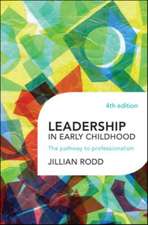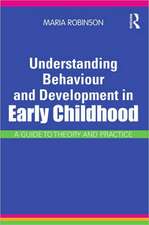Leading Change in the Early Years
Autor Jillian Rodden Limba Engleză Paperback – 16 dec 2014
Key content includes:
This book is ideal for early years leaders who understand the general principles and practice of leadership, but who are interested in exploring and expanding their understanding and expertise in leading reform and change.
Jillian Rodd is an educational and developmental psychologist and has published widely in the early childhood field throughout the world.
"This is a powerful text that utilises the voices of early years leaders to clearly articulate the challenges of leading change and demonstrate how the sector is rising to that challenge. It is, therefore, an excellent and vital resource for all working in the early years sector and comes at absolutely the right time as the pace of change in the sector continues to be fast flowing."
Dr Caroline Leeson, Associate Professor of Early Childhood Studies, Plymouth University
"This text draws on research evidence and case studies from practice to support those dealing with change on a daily basis. By encouraging early years professionals to draw on their skills of leadership and interpersonal relationships, Jillian provides clear strategies to enact change. This is a 'must have' book for all those working in the Early Years."
Nikki Fairchild, Early Years Initial Teacher Training Programme Coordinator, University of Chichester
"At a time when early years practitioners everywhere are feeling pressure to respond to the children's policy agenda, this accessible guide offers support in implementing and sustaining change. "
Rory McDowall Clark, Senior Lecturer in Early Childhood, Worcester University
"Jillian Rodd gives a contemporary view of leadership and change incorporating the latest research from the early years sector. The book provides insight to the complexities of leadership and change, essential understanding for both early years students and practitioners."
Natalie Canning, Lecturer in Education - Early Years, The Open University
"This latest book from Jillian Rodd is very accessible and will be invaluable for existing early childhood leaders, aspiring leaders and tertiary students. I have no doubt this book will be valued as a companion to the acclaimed Leadership in Early Childhood now in the 4th edition."
Kaye Colmer, CEO Gowrie SA
"Rodd's approach to leading change makes it possible to embrace challenges as opportunities. This book is a 'must read' for intentional leaders seeking practical strategies for the everyday realities of early childhood settings."
Manjula Waniganayake (PhD), Associate Professor at the Institute of Early Childhood , Macquarie University
Preț: 310.83 lei
Nou
Puncte Express: 466
Preț estimativ în valută:
59.48€ • 62.10$ • 49.22£
59.48€ • 62.10$ • 49.22£
Carte tipărită la comandă
Livrare economică 04-18 aprilie
Preluare comenzi: 021 569.72.76
Specificații
ISBN-13: 9780335263707
ISBN-10: 0335263704
Pagini: 176
Dimensiuni: 152 x 228 x 9 mm
Greutate: 0.27 kg
Editura: McGraw Hill Education
Colecția Open University Press
Locul publicării:United Kingdom
ISBN-10: 0335263704
Pagini: 176
Dimensiuni: 152 x 228 x 9 mm
Greutate: 0.27 kg
Editura: McGraw Hill Education
Colecția Open University Press
Locul publicării:United Kingdom
Cuprins
1. Change in early years provision
Understanding change
Theoretical perspectives of change
Dimensions of change
Process and models of change
The process of change as a cycle of learning
Factors that hinder and help the implementation of change2. Authentic leadership and change
Quality improvement through competent leadership
The power of leadership presence
Leadership skills for making change happen
Leadership roles for addressing change initiatives
3. Leadership: The fuel driving quality improvement
Differentiating leadership from management
The contribution of leadership to effecting change
The impact of complexity on leading change for improvement
A model for leading complex change
4. Interpersonal relationships: the foundations for effecting change
The role of trust in developing professional relationships
Professional interpersonal relationships in early years settings
Key interpersonal skills for leading change
Issues affecting interpersonal relationships in early years settings
Key skills for interpersonal competence in early years settings
5. Interpersonal communication: the key to effecting change
Communicating and listening: essential skills for effecting change
Emotional intelligence and leading change
Roadblocks to effective communication in early years settings
Communicating the vision for change
6. From reactive opposition to proactive receptivity to change
Moving from shock to adjustment
Reducing stress in times of change
Common reactions to conflict about change
Strategies for channeling opposition into commitment
Encouraging proactive receptivity to change
7. Effecting change through collective endeavor
Benefits of collective commitment through change champions
The power of collaborative teams in the change process
8. Sustaining change through a culture of learning The role of learning in change
Early years settings as learning organizations
Building a culture of learning and thinking
Learning, leadership and change
Learning and the development of capacity for change leadership
9. Postscript: Aide memoire for leading change in the early years
References
Author index
Subject Index
Understanding change
Theoretical perspectives of change
Dimensions of change
Process and models of change
The process of change as a cycle of learning
Factors that hinder and help the implementation of change2. Authentic leadership and change
Quality improvement through competent leadership
The power of leadership presence
Leadership skills for making change happen
Leadership roles for addressing change initiatives
3. Leadership: The fuel driving quality improvement
Differentiating leadership from management
The contribution of leadership to effecting change
The impact of complexity on leading change for improvement
A model for leading complex change
4. Interpersonal relationships: the foundations for effecting change
The role of trust in developing professional relationships
Professional interpersonal relationships in early years settings
Key interpersonal skills for leading change
Issues affecting interpersonal relationships in early years settings
Key skills for interpersonal competence in early years settings
5. Interpersonal communication: the key to effecting change
Communicating and listening: essential skills for effecting change
Emotional intelligence and leading change
Roadblocks to effective communication in early years settings
Communicating the vision for change
6. From reactive opposition to proactive receptivity to change
Moving from shock to adjustment
Reducing stress in times of change
Common reactions to conflict about change
Strategies for channeling opposition into commitment
Encouraging proactive receptivity to change
7. Effecting change through collective endeavor
Benefits of collective commitment through change champions
The power of collaborative teams in the change process
8. Sustaining change through a culture of learning The role of learning in change
Early years settings as learning organizations
Building a culture of learning and thinking
Learning, leadership and change
Learning and the development of capacity for change leadership
9. Postscript: Aide memoire for leading change in the early years
References
Author index
Subject Index









